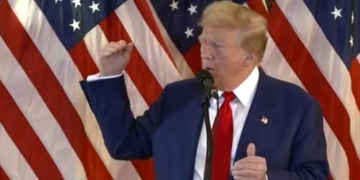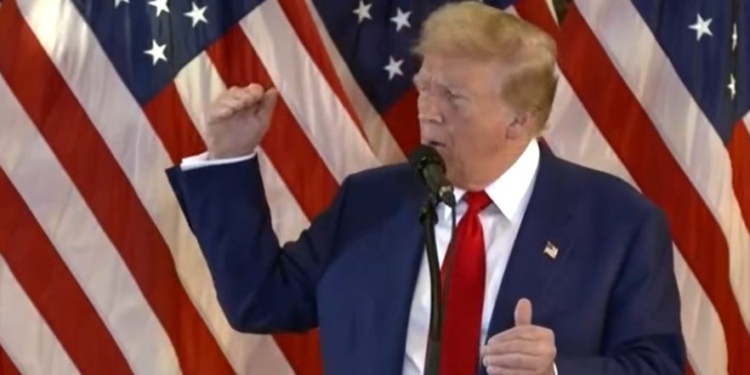Amid the fervent debate about the legal ramifications of former President Donald Trump’s conviction, there lies an intriguing potential for a unique political coalition to emerge.
HBO’s “Real Time” host and political commentator, Bill Maher, recently expressed concerns about the societal and political fallout should Trump face an incarceration sentence on July 11. Maher predicted a possible “civil war” instigated by Trump’s staunch Make America Great Again (MAGA) supporters, driven by perceptions of racial and judicial injustice.
However, Maher’s dire forecast might overlook an alternative and perhaps more constructive outcome.
Maher’s concerns center on fears of racial and civil unrest sparked by the MAGA core in response to charges brought by Manhattan District Attorney Alvin Bragg and a trial presided over by Colombian-born Justice Juan Merchan. Yet, rather than igniting division, the Trump conviction could paradoxically forge common ground between disparate groups on the far left and Trump’s sympathizers, potentially leading to a powerful coalition capable of reshaping the political landscape.
Historically, advocates of criminal justice reform have argued that systemic biases lead to disproportionate prosecutions and incarcerations based on identity rather than actions. In many cases, this contention may hold significant merit.
Viewed through a similar lens, Trump’s conviction could serve as a rallying point for those advocating against what they perceive as biased legal persecution. Trump’s supporters argue that his conviction is less about legal transgressions and more about targeting him due to his political identity.
Bragg’s campaign promise to go after Donald Trump rather than focusing on broader crime prevention raises concerns about impartiality. If Trump’s constitutional protections appear disregarded in New York’s legal proceedings, this aligns with the grievances of criminal-justice reform advocates who argue that the system often targets individuals based on their identity rather than their deeds.
This alignment of perspectives lays the groundwork for coalition-building. Despite stark ideological differences, both groups might recognize shared interests in criminal-justice reform. Such dialogue could foster a coalition capable of advocating for broader systemic changes, transcending traditional political divides.
Furthermore, Trump’s conviction raises questions about New York’s political and economic future. Political analysts are exploring whether Trump’s claim that New York might become electorally competitive holds water. Post-conviction, New York’s business community might reevaluate their stance, potentially becoming more receptive to Trump’s agenda.
Concerns about arbitrary legal actions against businesses could drive them to support a candidate promising regulatory and judicial reforms.
Merchan’s handling of the case, criticized by legal scholars like John Yoo, highlights serious constitutional concerns. Yoo argues that Merchan’s actions violated Trump’s right to clear notice of charges and improperly allowed state prosecution of alleged federal election law violations, underscoring a potential disregard for constitutional safeguards.
Merchan’s background and perceived unfamiliarity with the intrinsic values of the U.S. Constitution might explain these lapses. His approach, seemingly driven by a belief that “the end justifies the means,” raises fundamental questions about judicial integrity.
As the English Justice William Blackstone asserted in the 18th Century, “it is better that ten guilty persons escape than that one innocent suffers.” Trump’s conviction symbolizes a departure from this principle, raising alarms about the erosion of constitutional adherence and judicial integrity.
The American people deserve a legal system that upholds the highest standards of fairness and justice. Trump’s conviction, controversial and polarizing as it is, could catalyze a movement toward renewed judicial integrity and systemic reform.
By bridging ideological divides and fostering dialogue, a powerful coalition could emerge, advocating for a legal system that truly embodies the principles of justice and equality for all.
Trey Trainor currently serves as a US Senate confirmed Federal Election Commissioner. He formerly served as FEC chairman in 2020. Jim Ellis is the founder of the Ellis Insight election analysis service.
The views and opinions expressed in this commentary are those of the author and do not reflect the official position of the Daily Caller News Foundation.
(Featured Image Media Credit: Screen Capture/CSPAN)
All content created by the Daily Caller News Foundation, an independent and nonpartisan newswire service, is available without charge to any legitimate news publisher that can provide a large audience. All republished articles must include our logo, our reporter’s byline and their DCNF affiliation. For any questions about our guidelines or partnering with us, please contact [email protected].



























 Continue with Google
Continue with Google